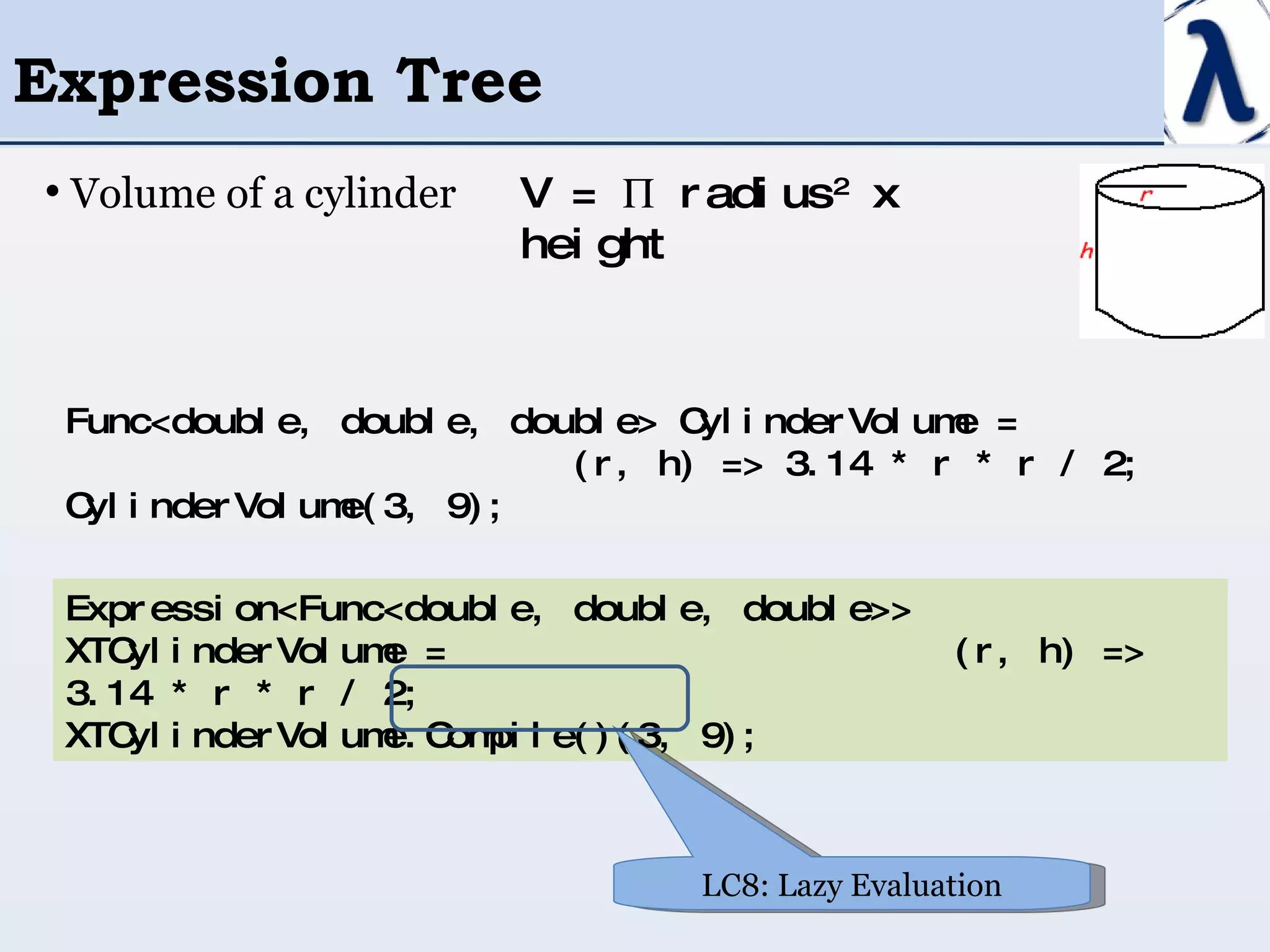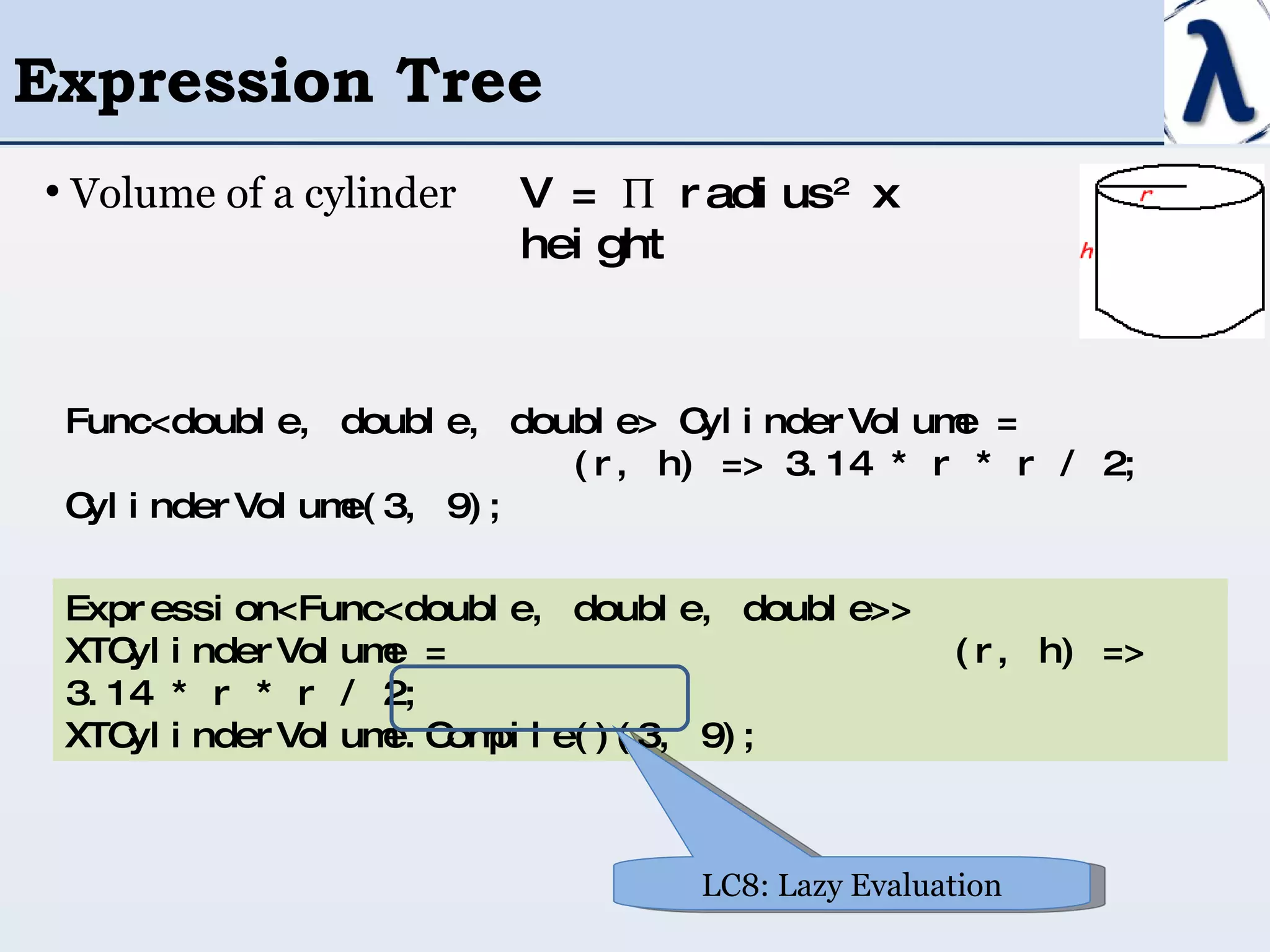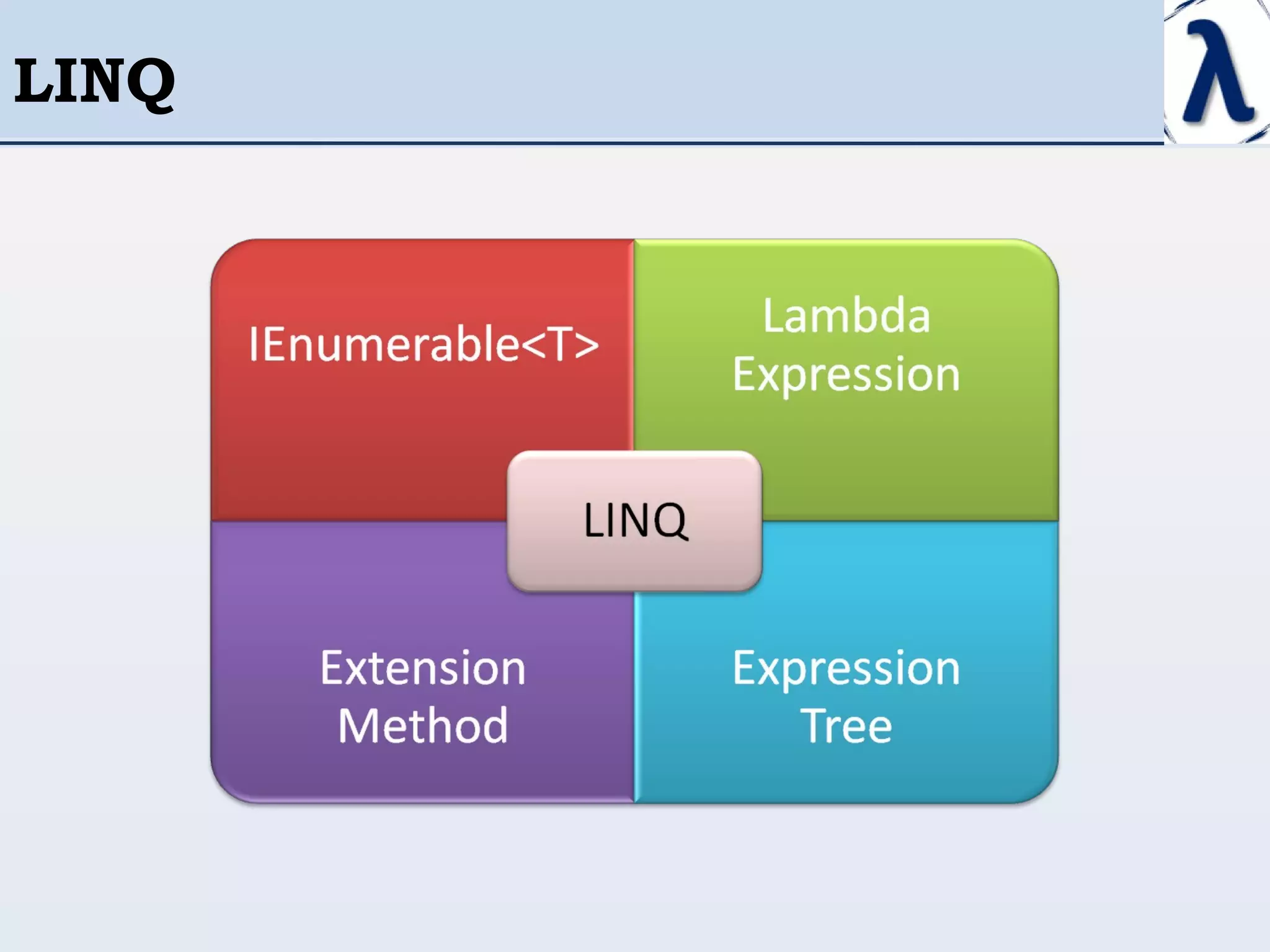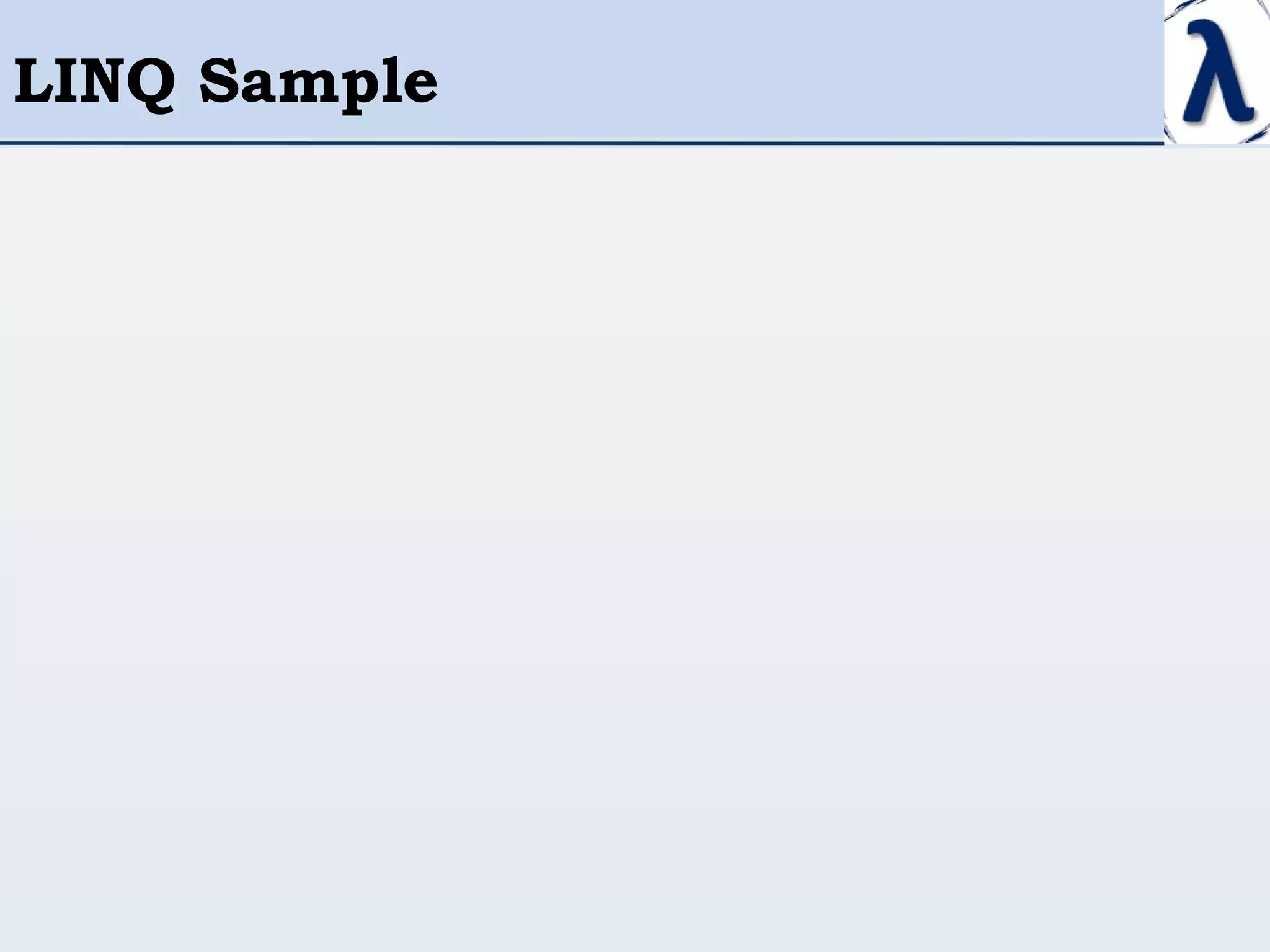The document discusses programming paradigms, contrasting procedural and functional programming, including their methodologies, syntax, and semantics. It outlines key concepts such as recursive functions, lambda calculus, delegate types in C#, and immutability, emphasizing the advantages of functional programming practices like higher-order functions and expression trees. Additionally, it touches on the evolution of programming techniques in C# and the significance of lazy evaluation and type safety in modern programming.
![M Sheik Uduman Ali Technical Lead iSOFT Plc [email_address] Let Us Learn](https://image.slidesharecdn.com/let-us-learn-lambda-using-c-30-1231502536209630-1/75/Let-Us-Learn-Lambda-Using-C-3-0-1-2048.jpg)
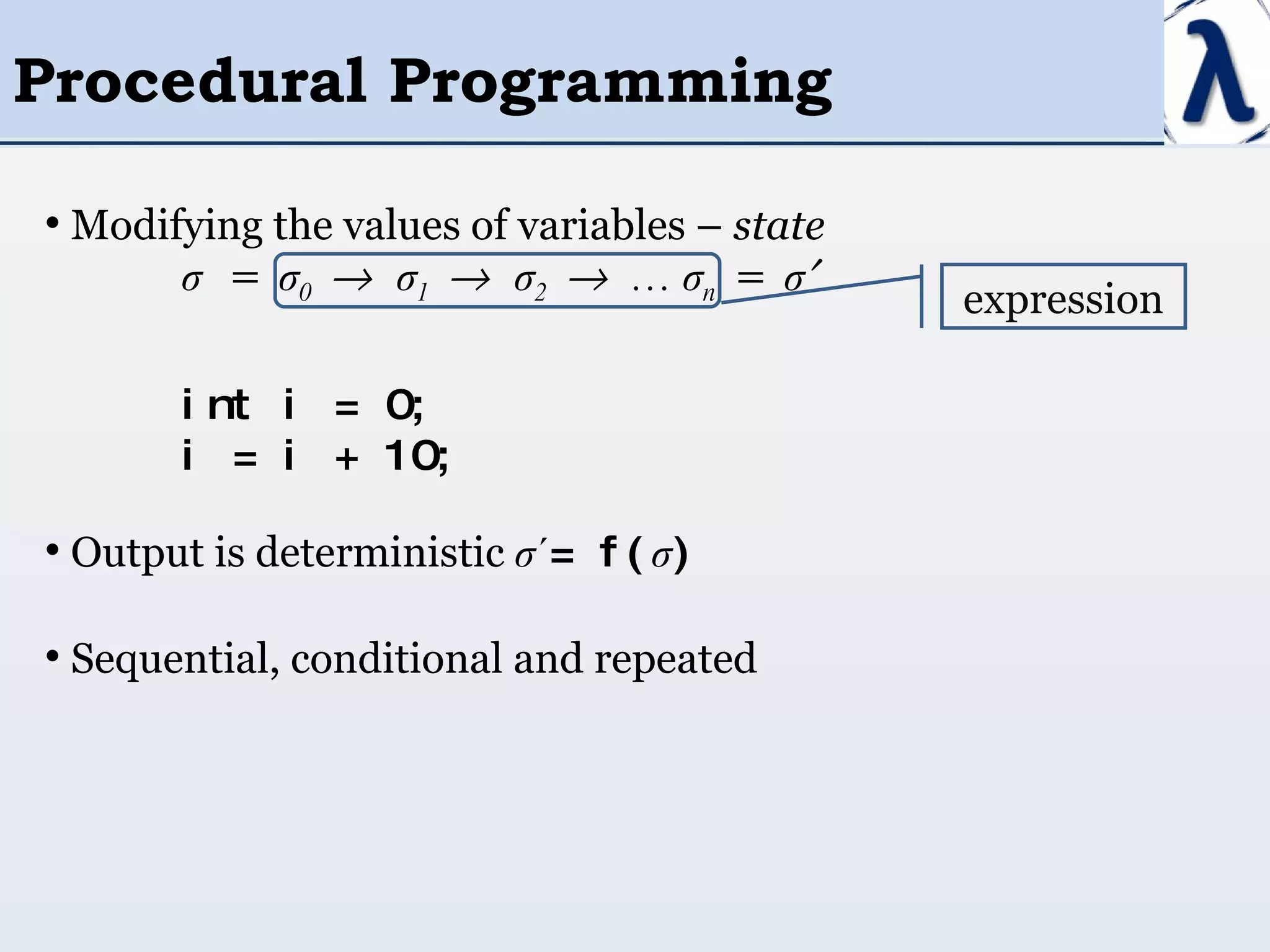
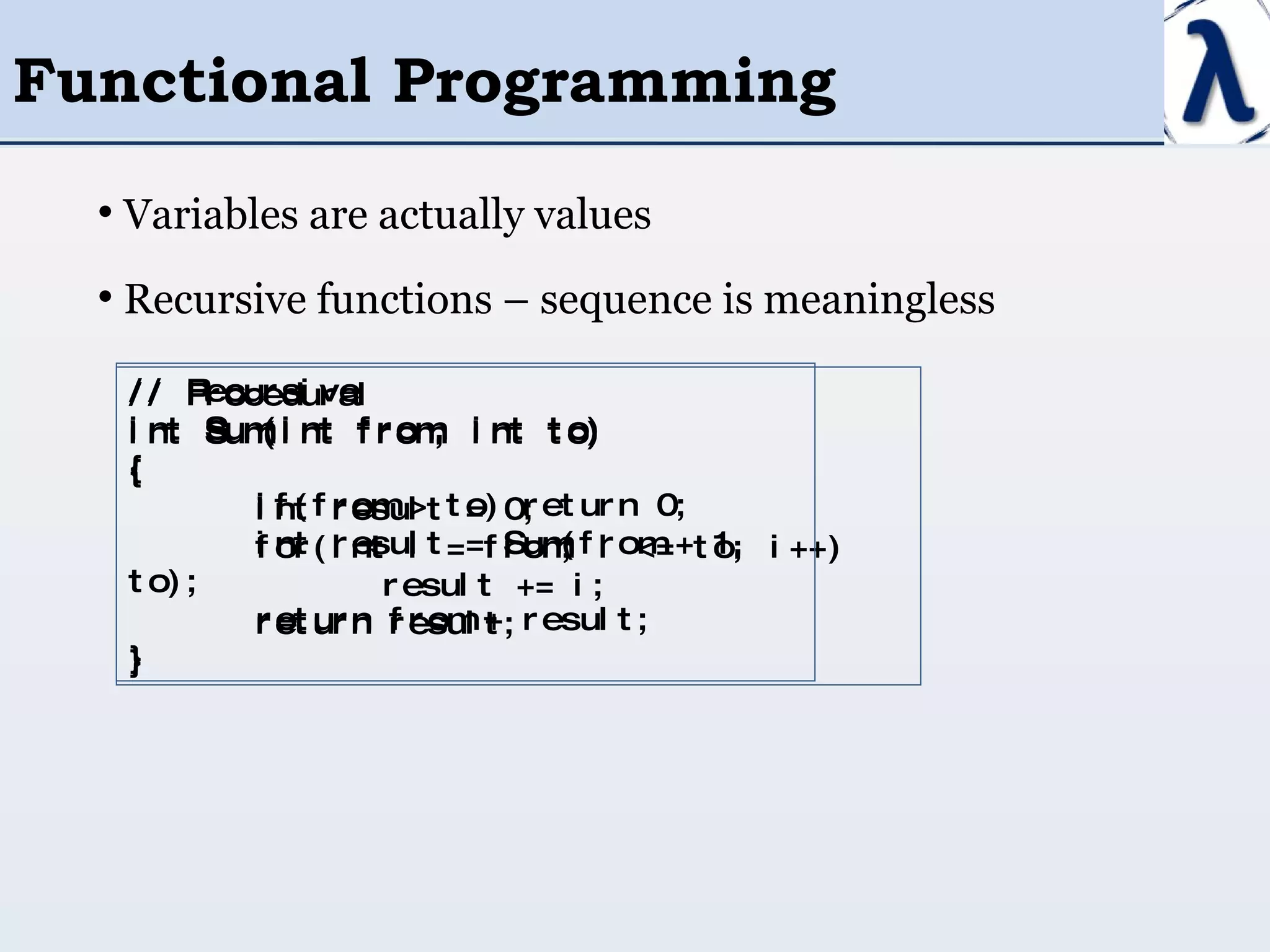
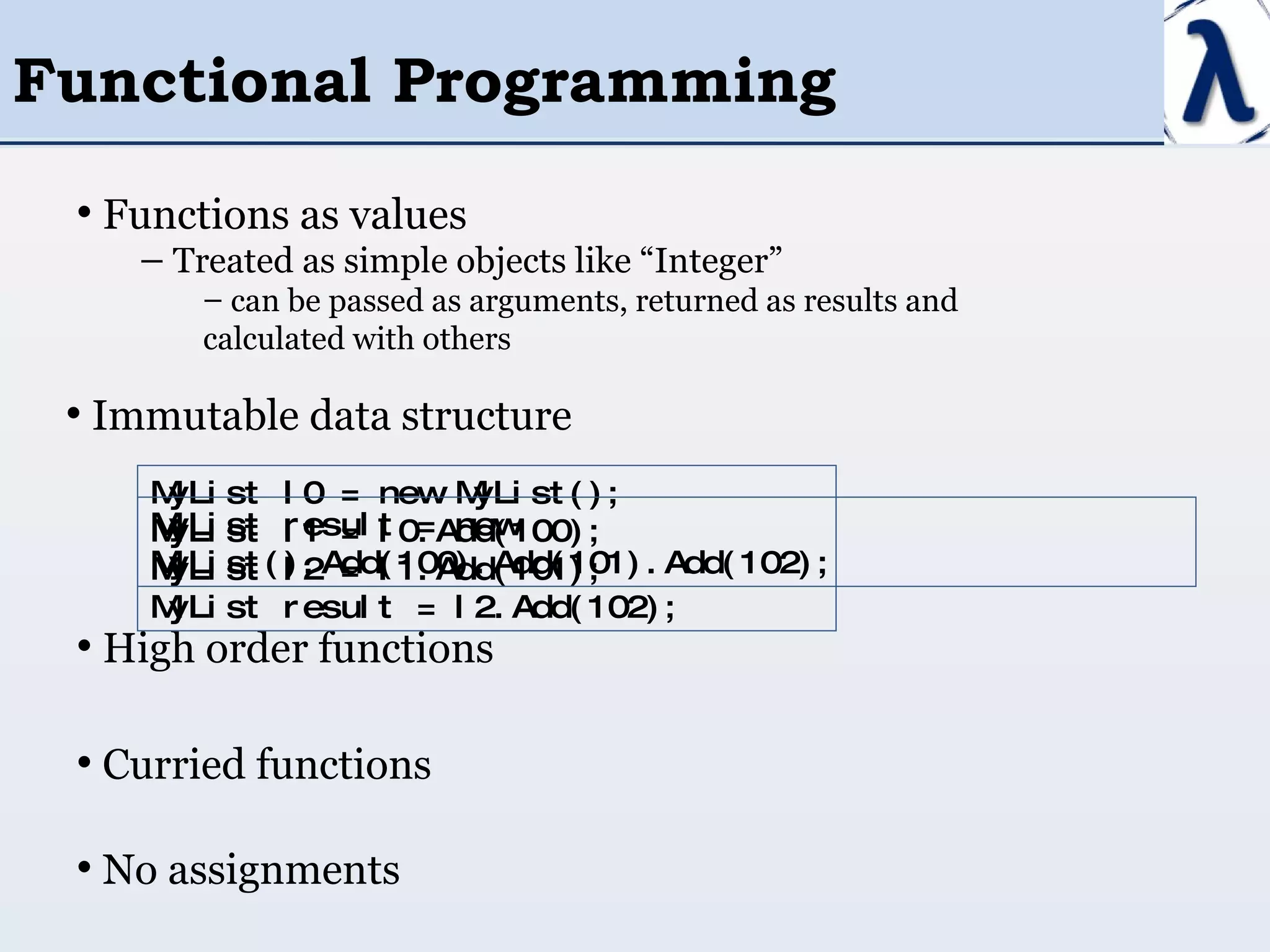
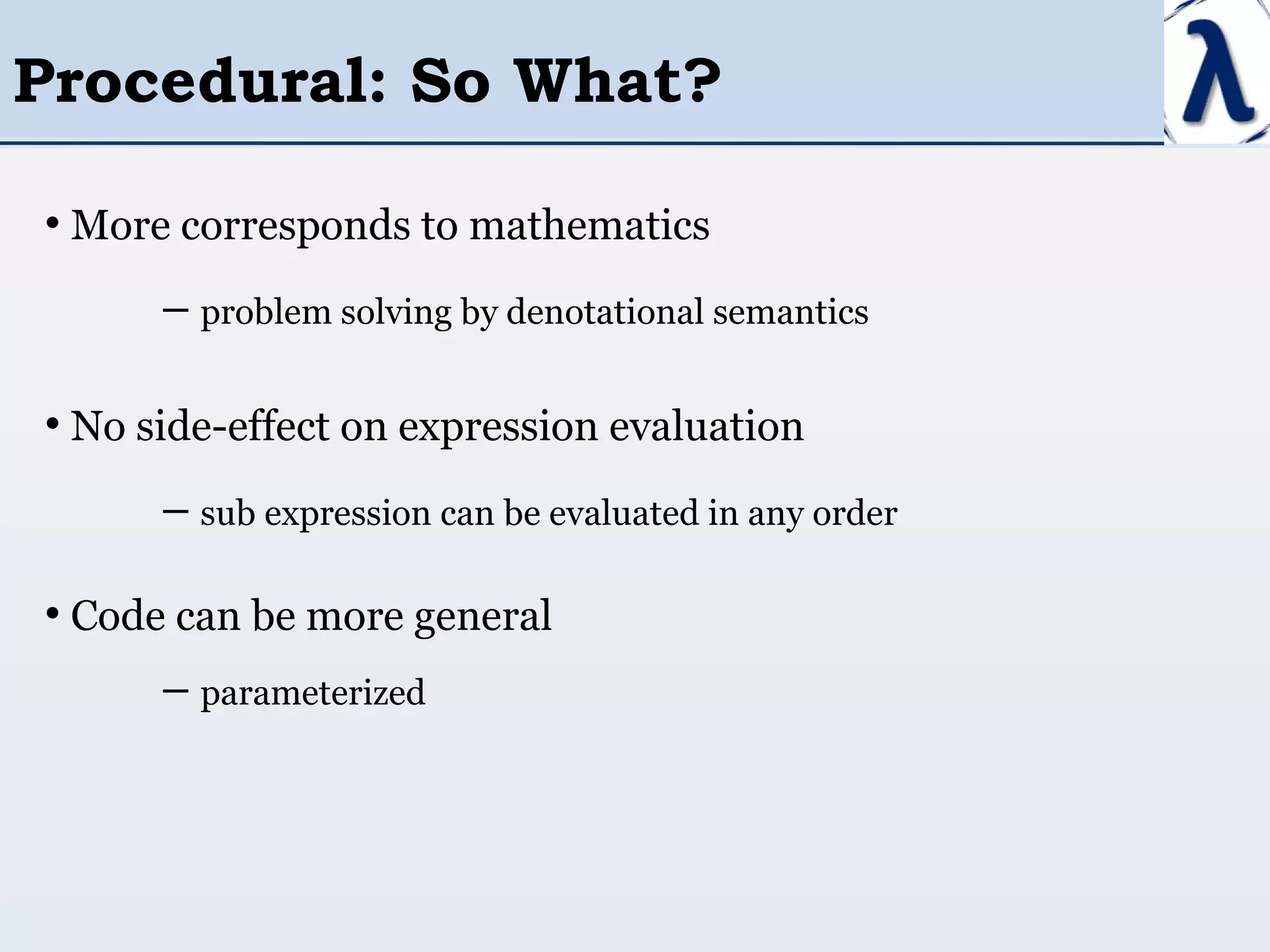
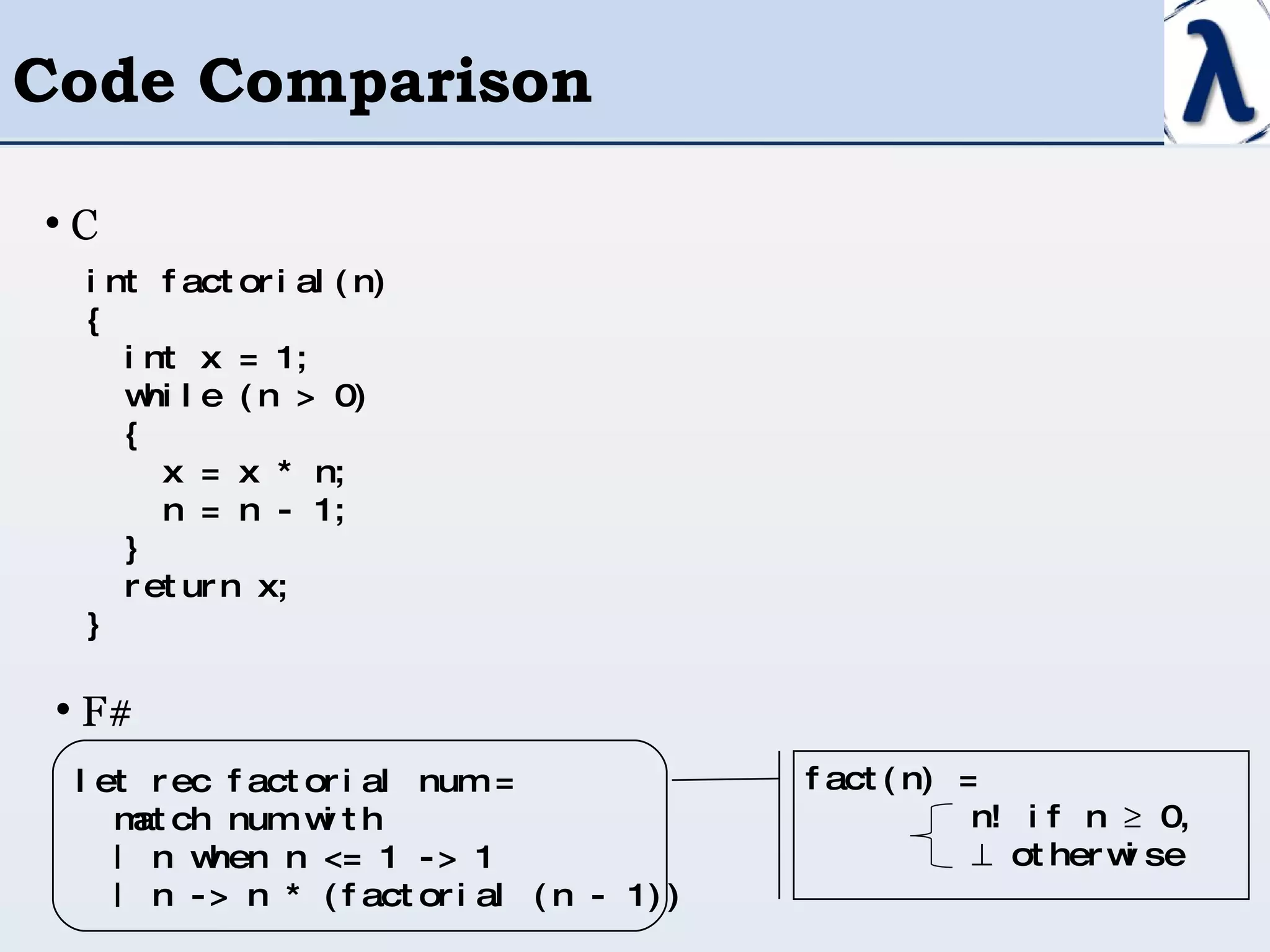
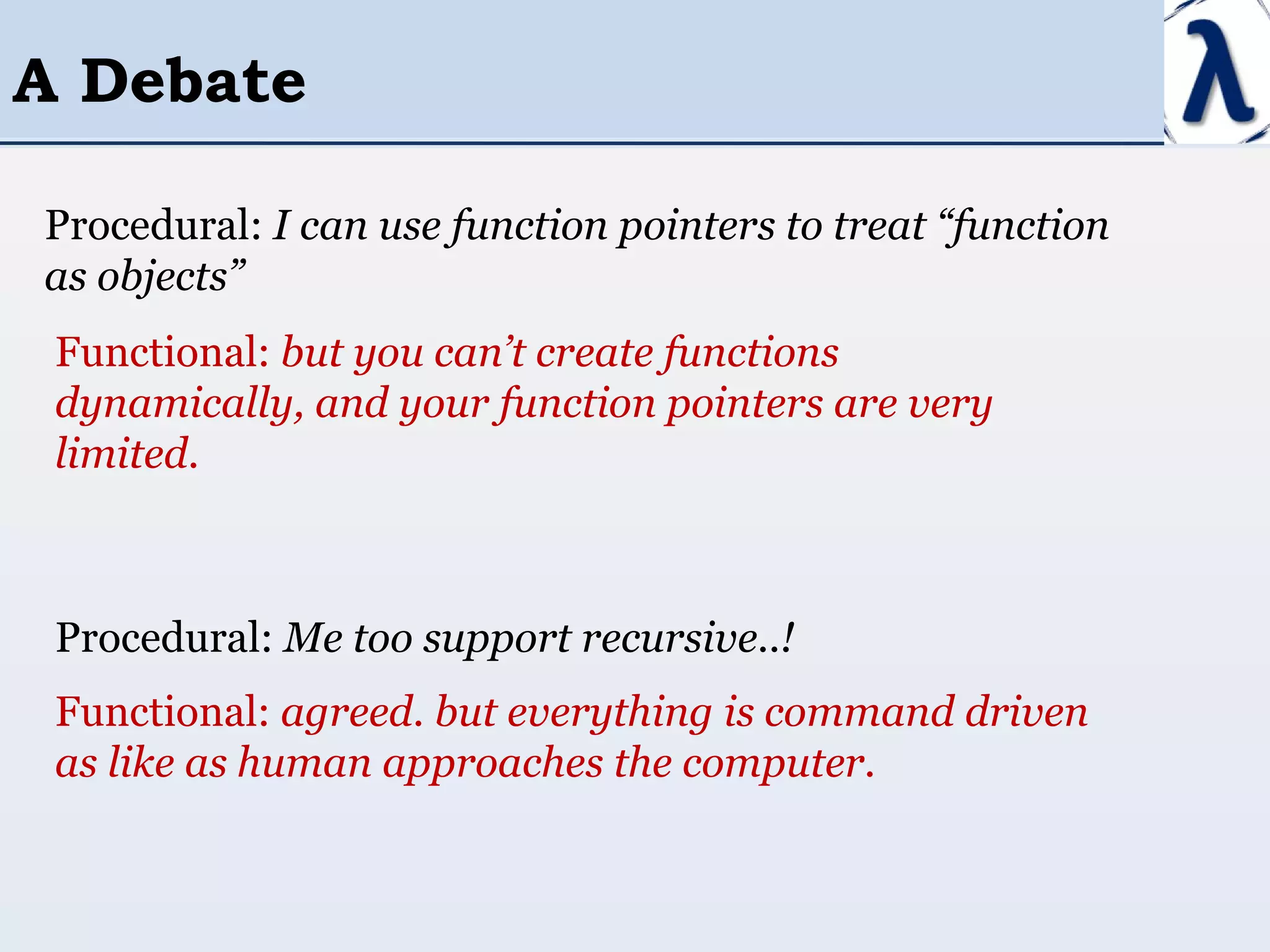
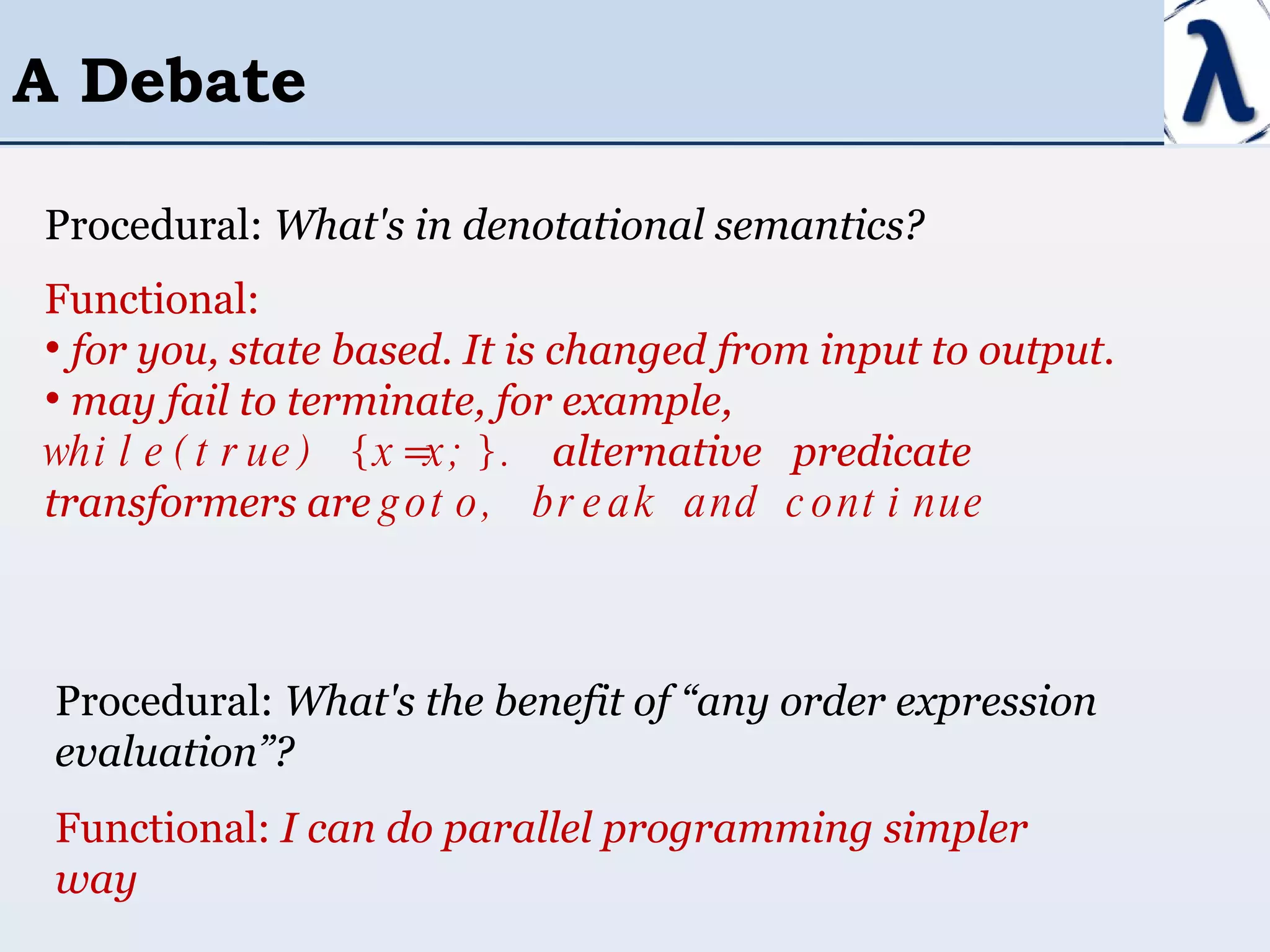
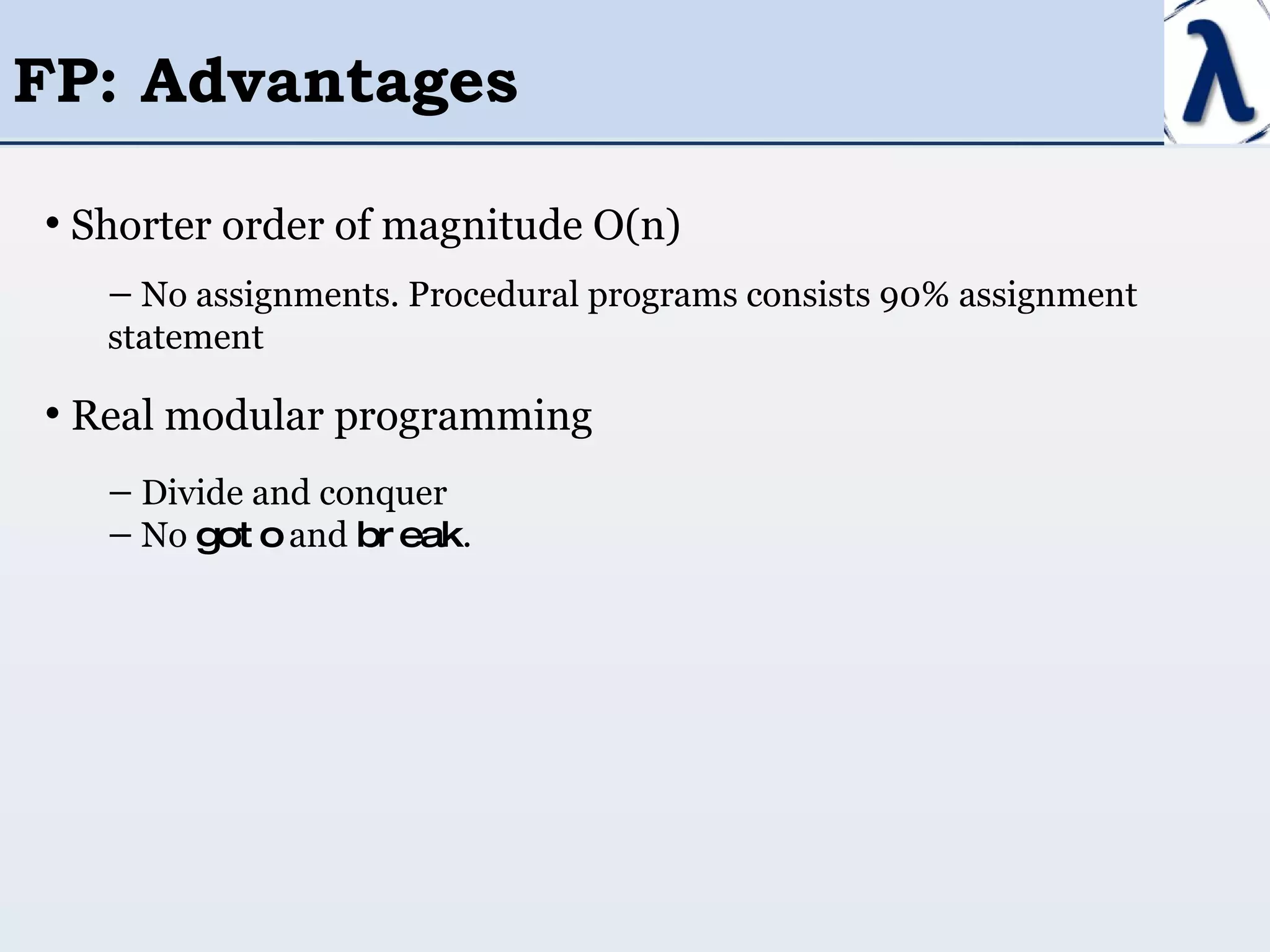
![Need for Lambda Calculus But in high order functions, insistence on naming is rather inconsistent, for example Define x and y by x = 2 and y = 4. Then xx = y Lambda notation allows to denote functions without naming λx.t[x] for example, λ x.x + 1 λ x.x 2 function argument fn. body](https://image.slidesharecdn.com/let-us-learn-lambda-using-c-30-1231502536209630-1/75/Let-Us-Learn-Lambda-Using-C-3-0-10-2048.jpg)
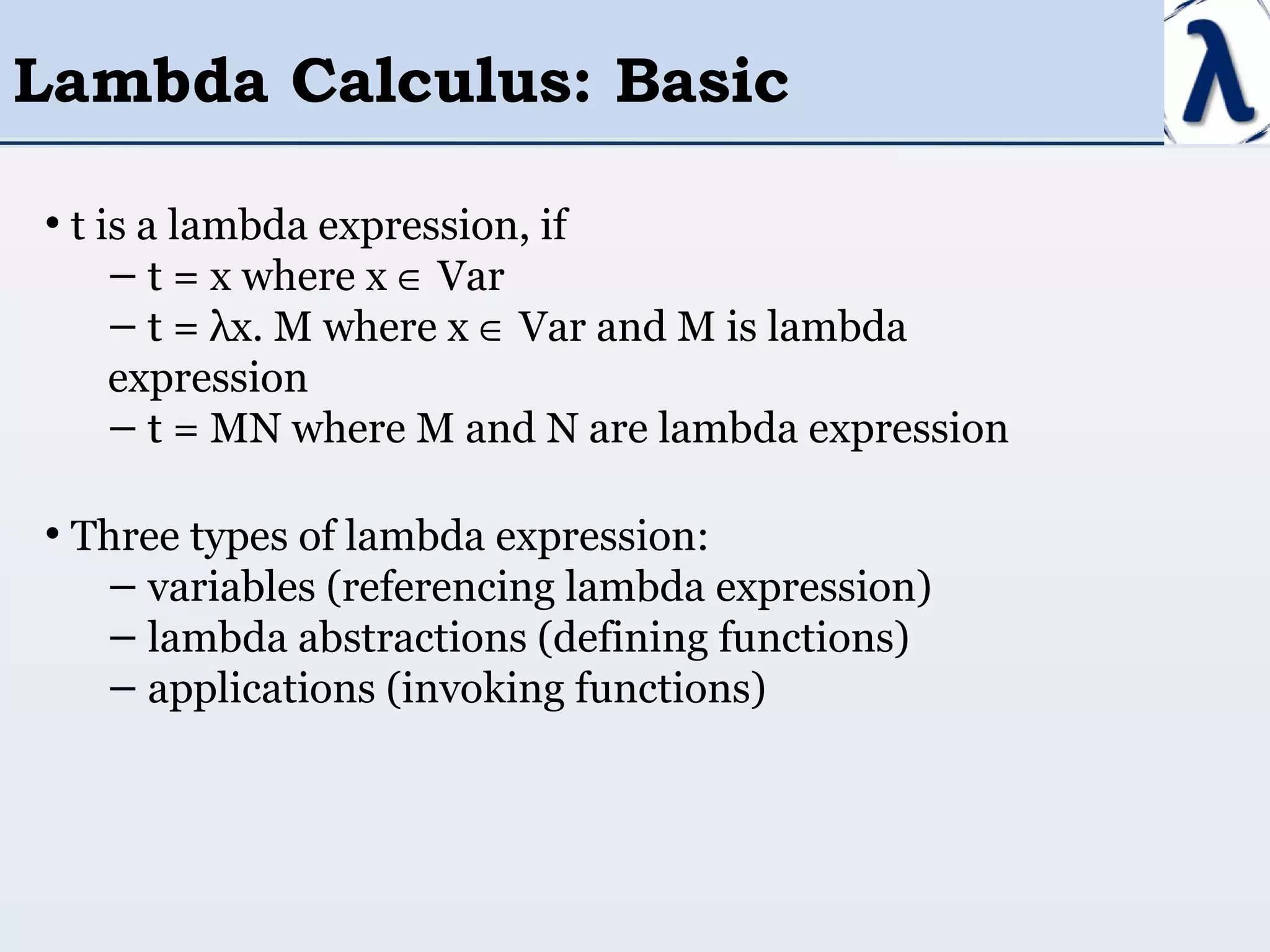
![Lambda Calculus: Basic In the expression λ x.xy, x is bound variable (fall within the scope of λ ) y is free variable (take the value from expression) Using lambda notation, traditional f(x) can be written as f x . i.e. left association f x y means ( f ( x ) ) ( y ) λ x. λ y.t[x,y] can be written as λ x y.t[x,y] currying](https://image.slidesharecdn.com/let-us-learn-lambda-using-c-30-1231502536209630-1/75/Let-Us-Learn-Lambda-Using-C-3-0-12-2048.jpg)
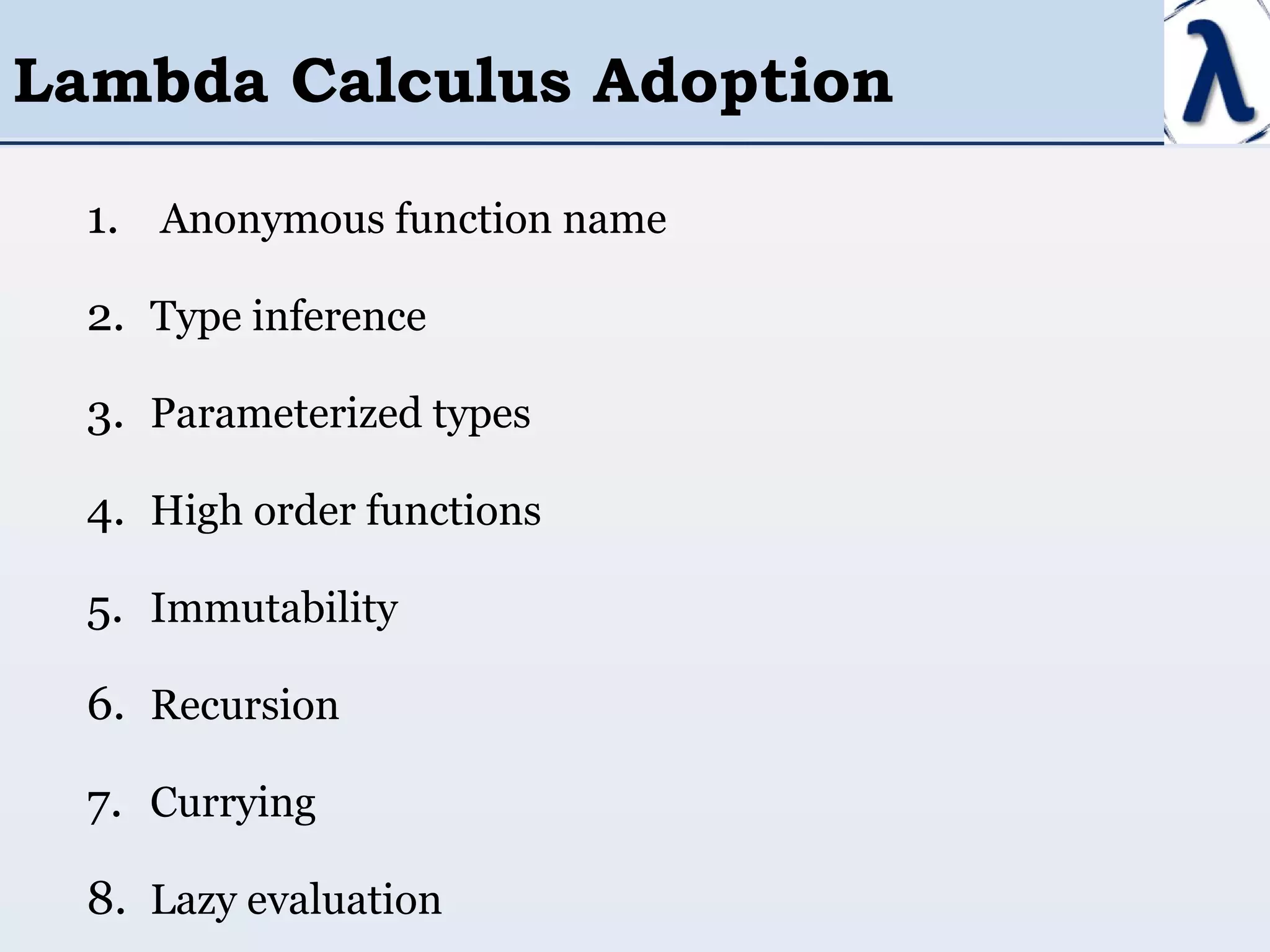
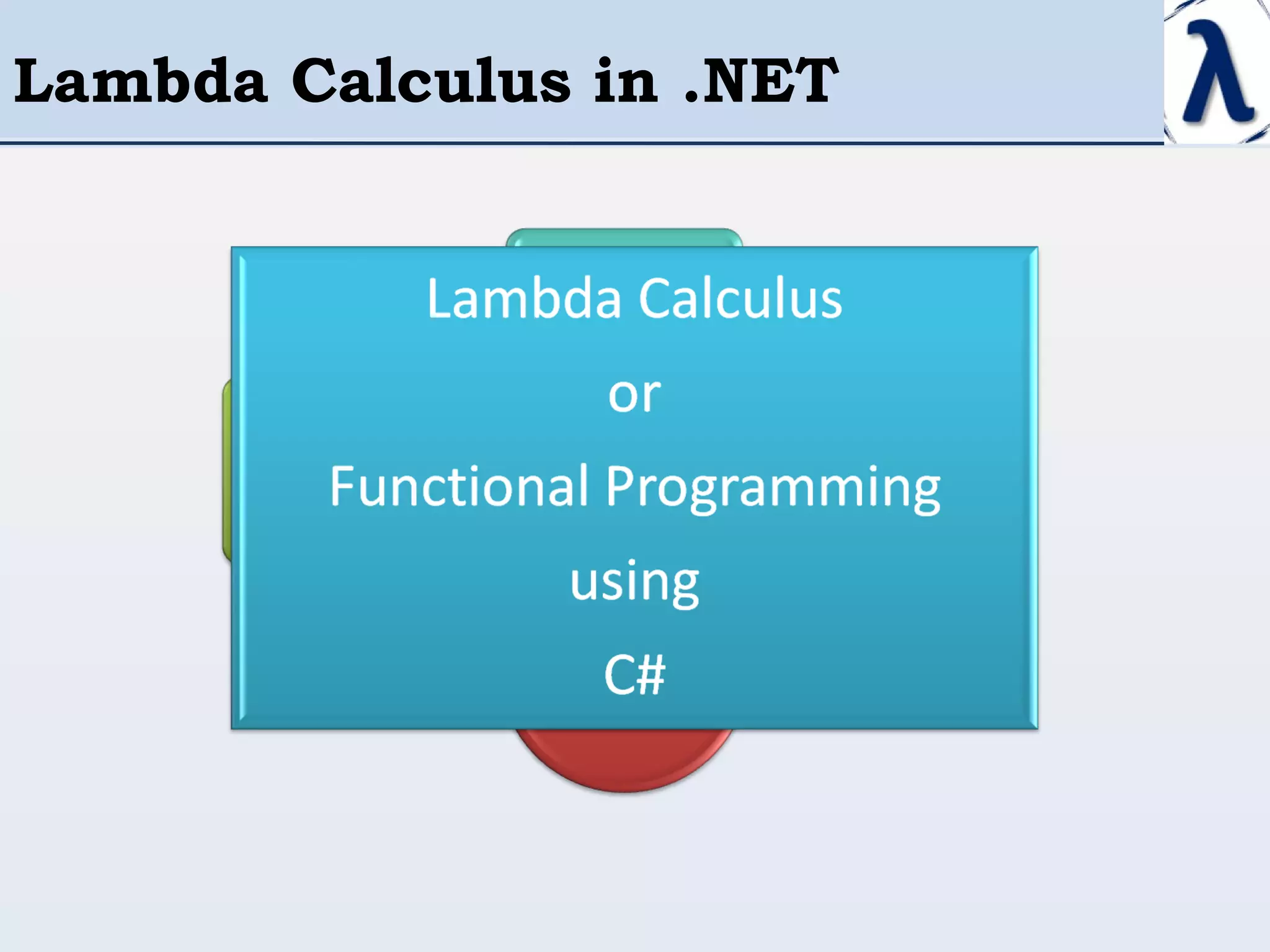
![Delegates Introduced in C# 1.0, much improved in C# 2.0 Dynamically wire up a method caller to its target method Two aspects: type and instance. delegate int Transformer(int x); static void Main(string[] args) { Transformer t = Square; int result = t(3); Console.WriteLine(result); Console.ReadLine(); } static int Square(int x) {return x * x;} type instance actually Transformer t = new Transformer(Square)](https://image.slidesharecdn.com/let-us-learn-lambda-using-c-30-1231502536209630-1/75/Let-Us-Learn-Lambda-Using-C-3-0-15-2048.jpg)
![Anonymous Methods Introduced in C# 2.0 Define methods without name by delegate Compiler does closure-conversion delegate int Transformer(int x); static void Main(string[] args) { Transformer t = delegate(int x) { return x * x; }; int result = t(3); Console.WriteLine(result); Console.ReadLine(); } LC1: Anonymous Function Name private static Transformer CS$<>9__CachedAnonymousMethodDelegate1; private static int <Main>b__0(int x) { return (x * x); } Compiler generated](https://image.slidesharecdn.com/let-us-learn-lambda-using-c-30-1231502536209630-1/75/Let-Us-Learn-Lambda-Using-C-3-0-16-2048.jpg)
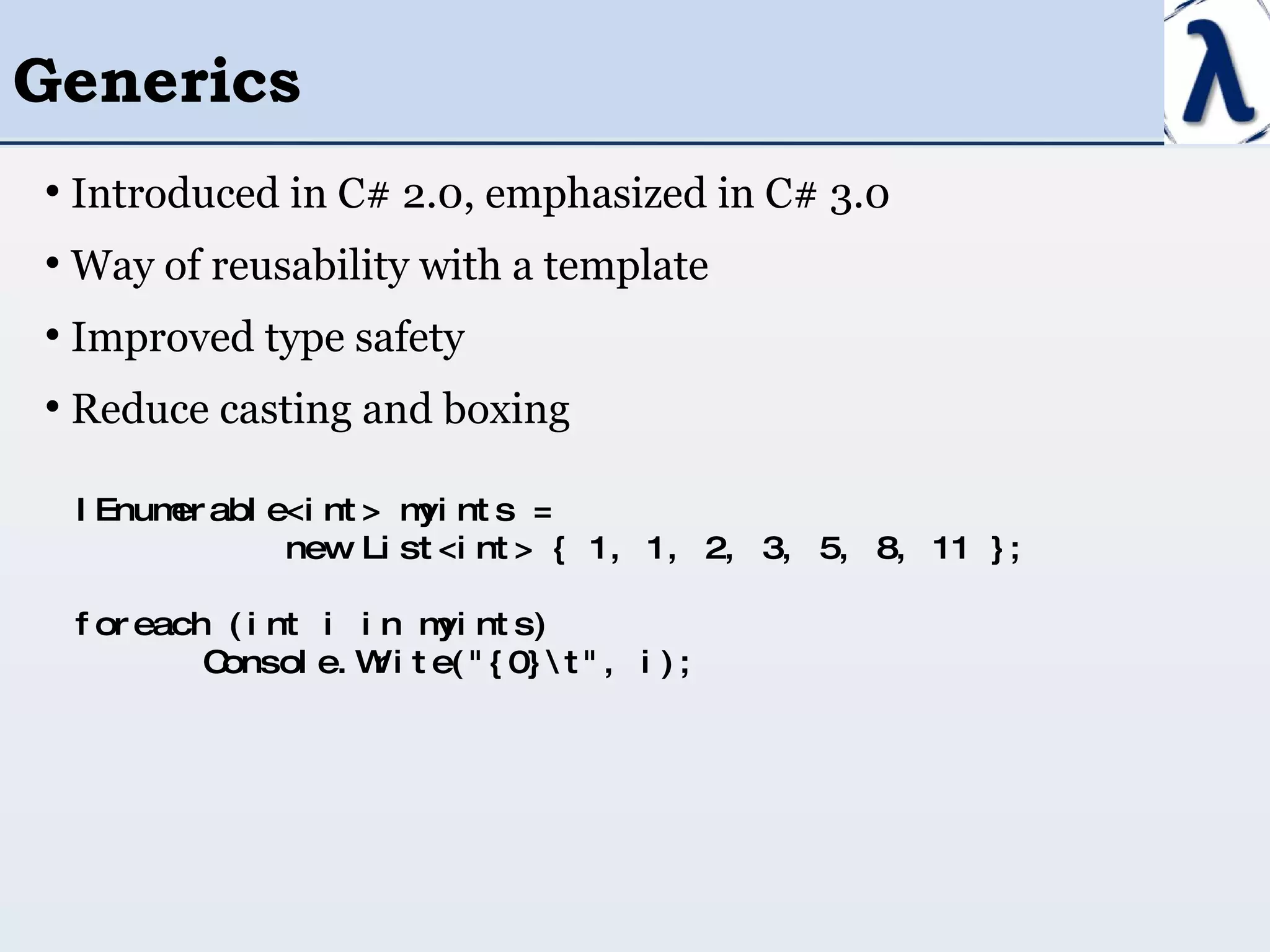
![Lambda Expression C# 3.0’s anonymous method Anonymous method written in place of a delegate instance. delegate int Transformer(int x); static void Main(string[] args) { Transformer t = x => return x * x; int result = t(3); Console.WriteLine(result); Console.ReadLine(); } Lighter syntax Implicit typed parameters LC2: Type inference](https://image.slidesharecdn.com/let-us-learn-lambda-using-c-30-1231502536209630-1/75/Let-Us-Learn-Lambda-Using-C-3-0-18-2048.jpg)
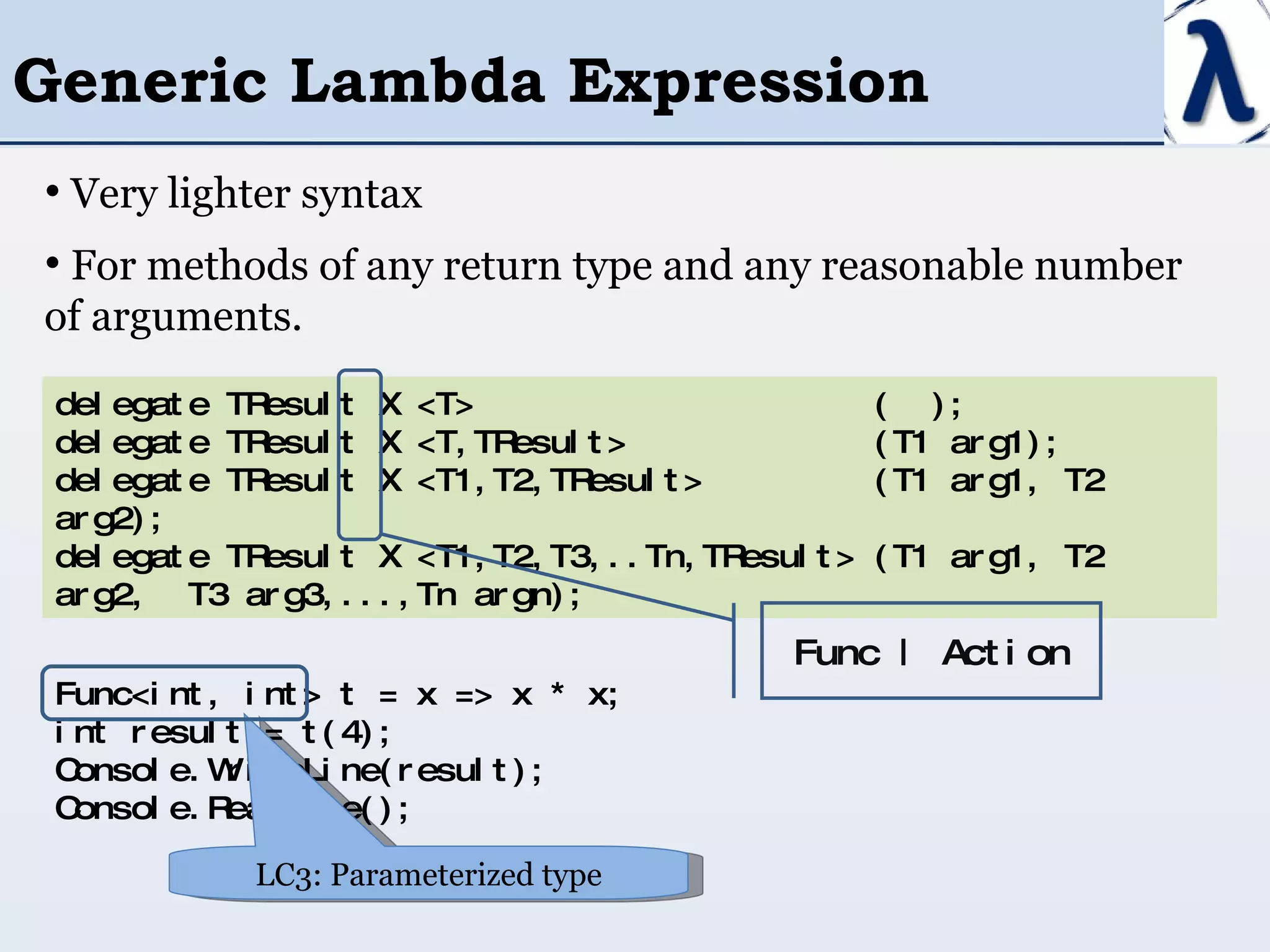
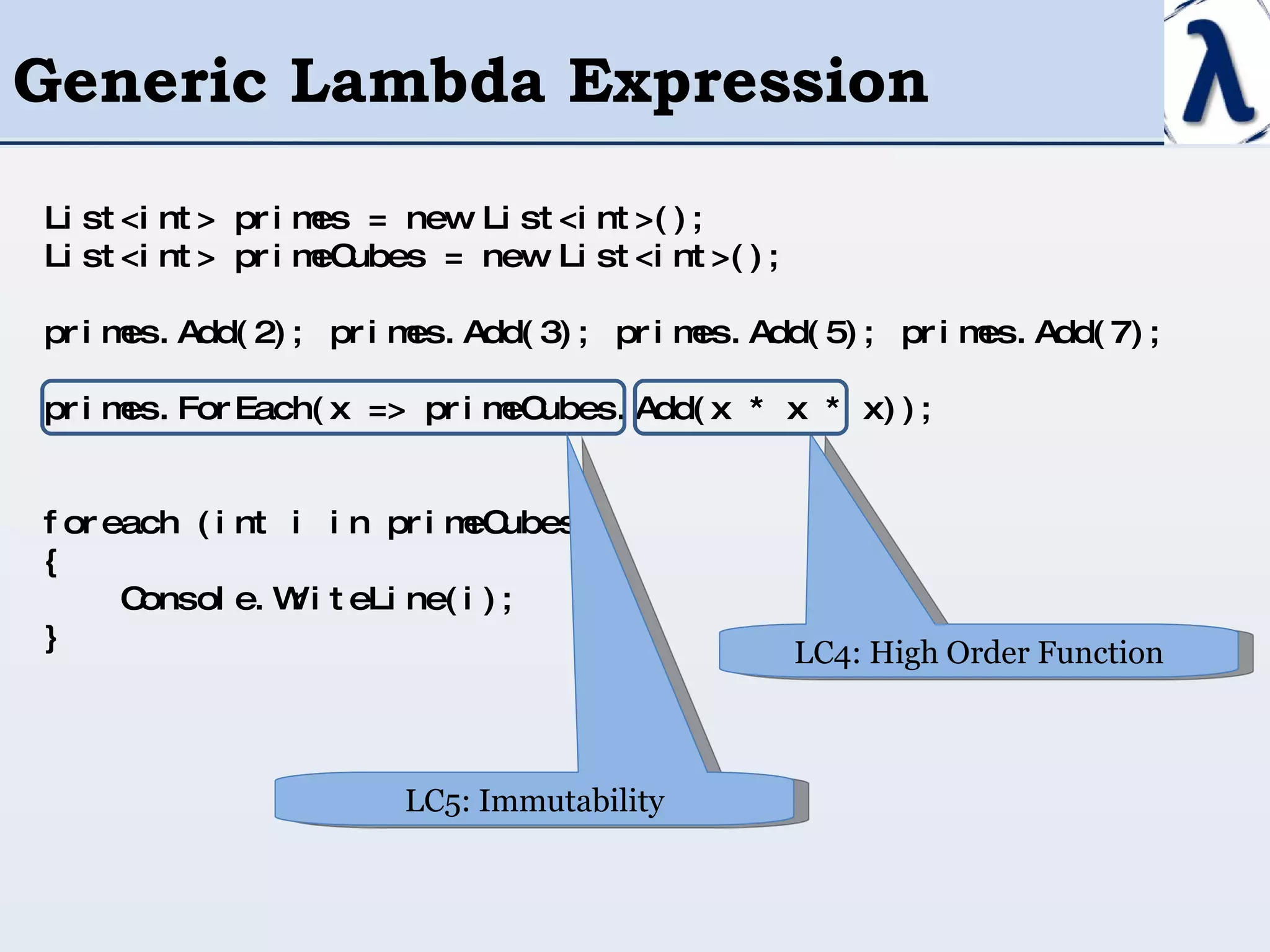
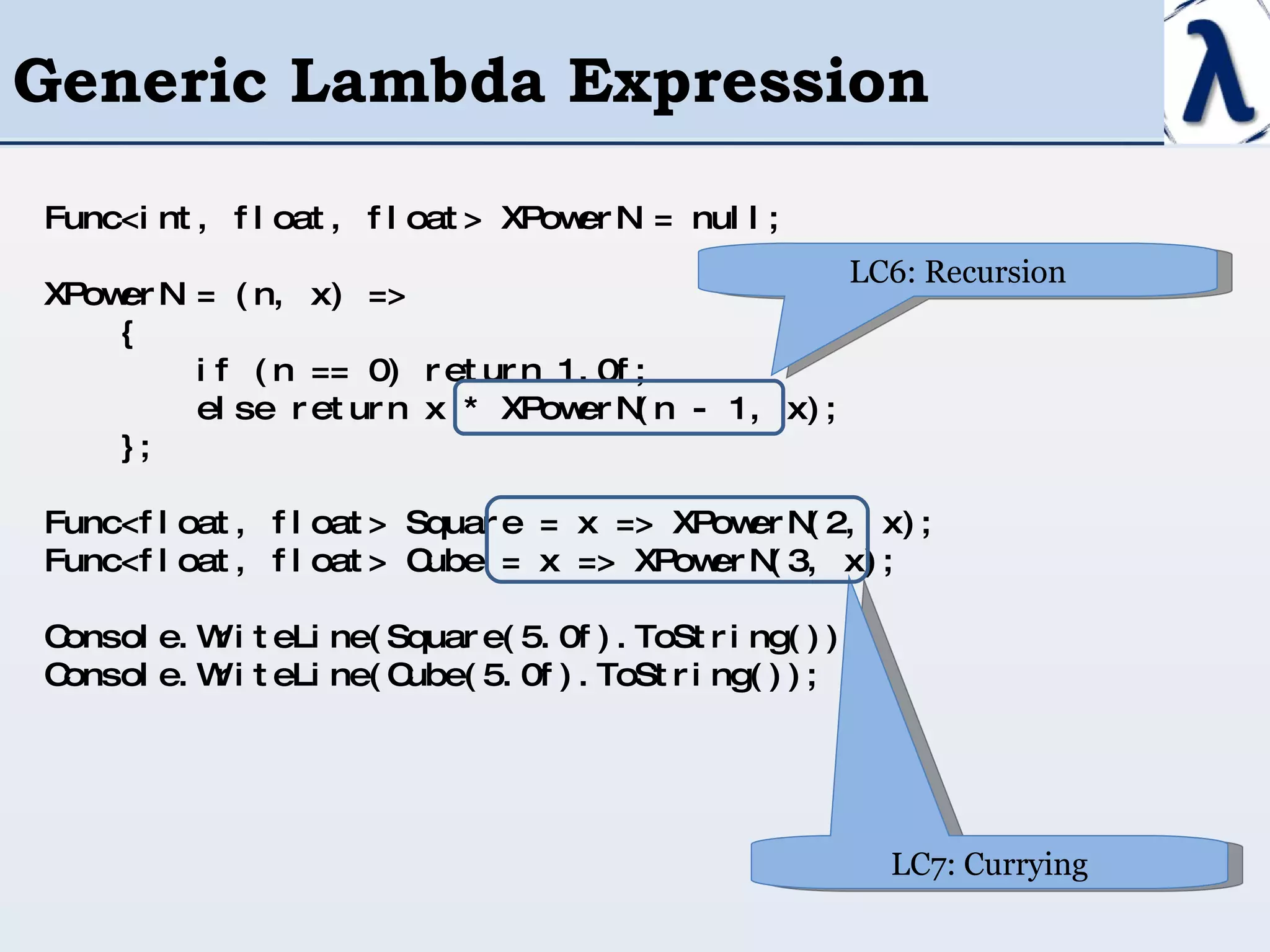
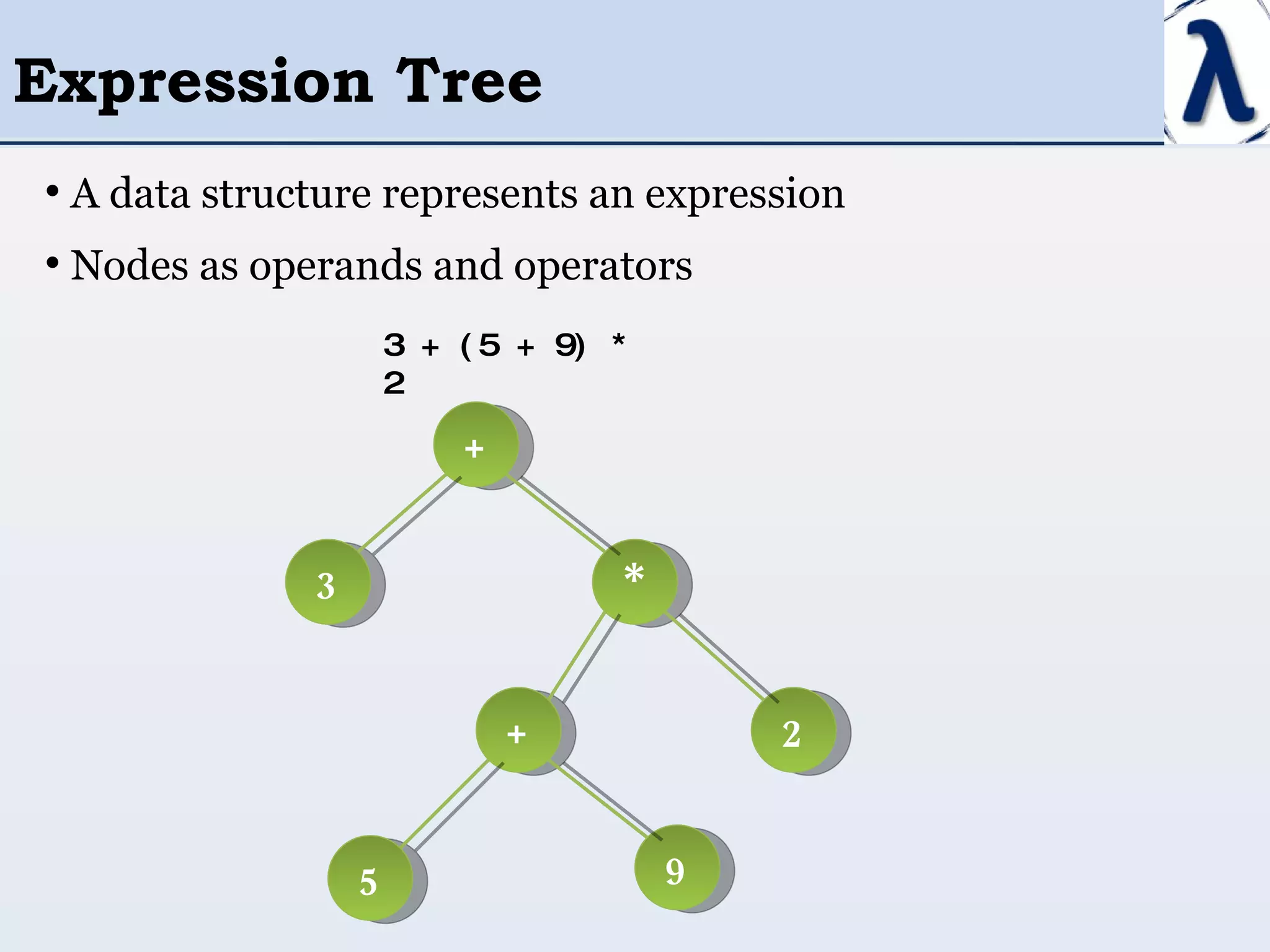
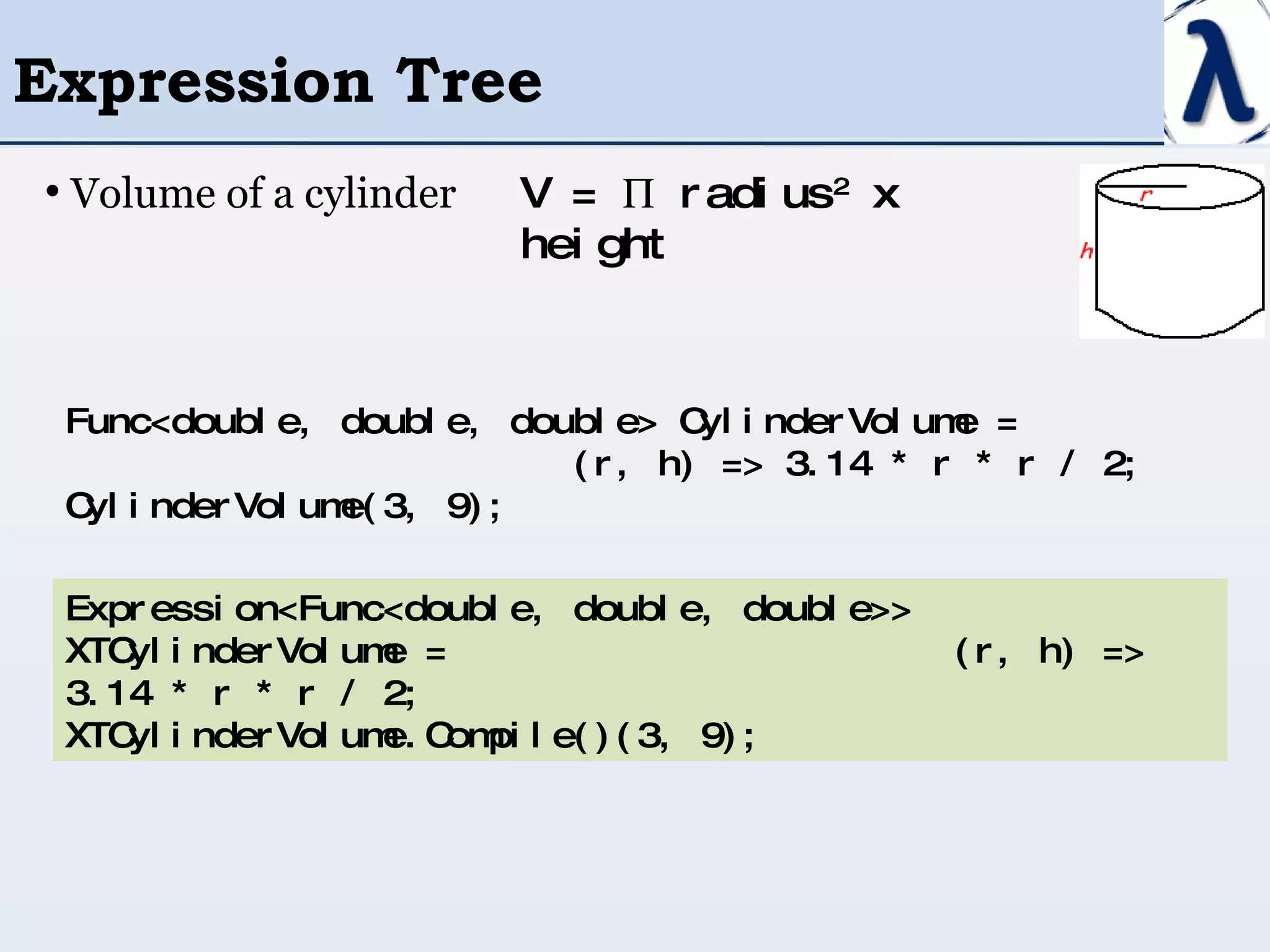
![IL Code for Delegate Lambda [CompilerGenerated] private static double <Main>b__0(double r, double h) { return (((3.14 * r) * r) / 2.0); } [CompilerGenerated] private static Func<double, double, double> CS$<>9__CachedAnonymousMethodDelegate1; private static void Main(string[] args) { Func<double, double, double> CylinderVolume = delegate (double r, double h) { return ((3.14 * r) * r) / 2.0; }; }](https://image.slidesharecdn.com/let-us-learn-lambda-using-c-30-1231502536209630-1/75/Let-Us-Learn-Lambda-Using-C-3-0-24-2048.jpg)
![IL Code for Expression Tree private static void Main(string[] args) { ParameterExpression CS$0$0000; ParameterExpression CS$0$0001; Expression<Func<double, double, double>> XTCylinderVolume = Expression.Lambda<Func<double, double, double>> (Expression.Divide(Expression.Multiply(Expression.Multiply(Expression.Constant(3.14, typeof(double)), CS$0$0000 = Expression.Parameter(typeof(double), "radius")), CS$0$0001 = Expression.Parameter(typeof(double), "height")), Expression.Constant(2.0, typeof(double))), new ParameterExpression[] { CS$0$0000, CS$0$0001 }); }](https://image.slidesharecdn.com/let-us-learn-lambda-using-c-30-1231502536209630-1/75/Let-Us-Learn-Lambda-Using-C-3-0-25-2048.jpg)
